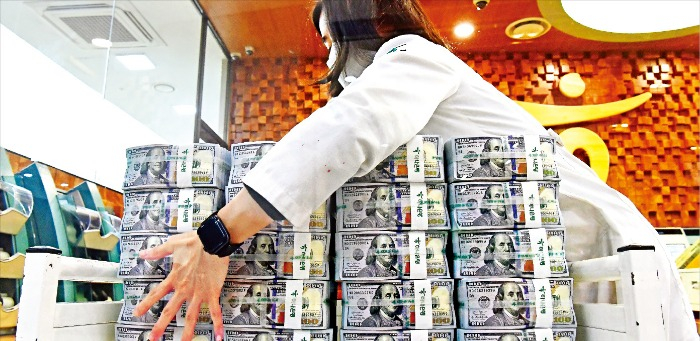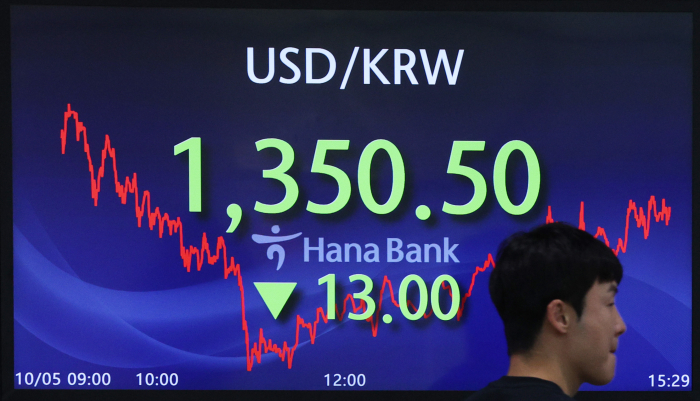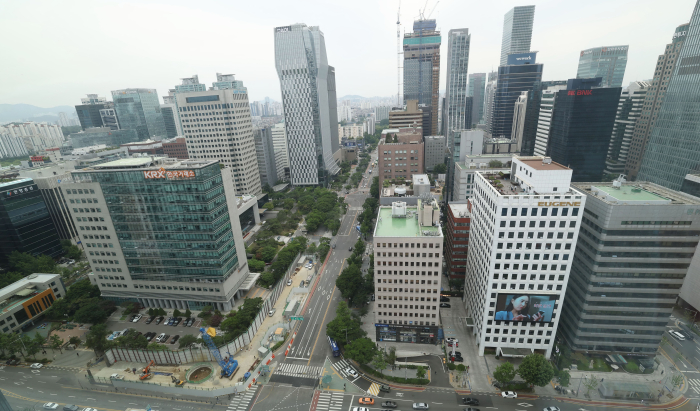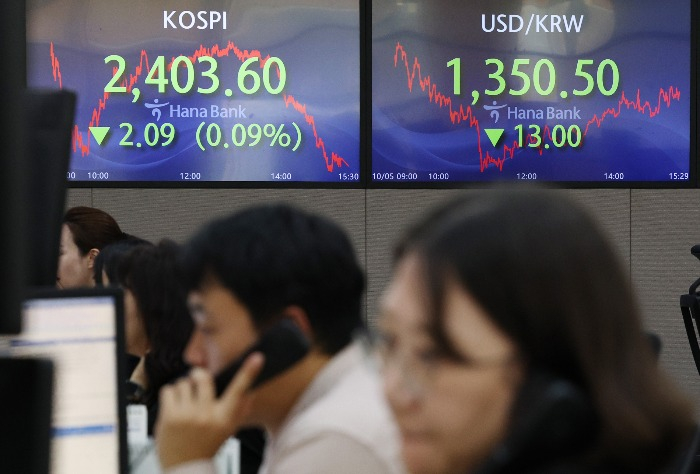Markets
Korean bond market squeezed by maturing debt, new issues
The domestic corporate bond market faces $8.5 billion in debt maturing later this year
By Oct 05, 2023 (Gmt+09:00)
3
Min read
Most Read
LG Chem to sell water filter business to Glenwood PE for $692 million


Kyobo Life poised to buy Japan’s SBI Group-owned savings bank


KT&G eyes overseas M&A after rejecting activist fund's offer


StockX in merger talks with Naver’s online reseller Kream


Mirae Asset to be named Korea Post’s core real estate fund operator



South Korea’s corporate bond market is saddled with a massive amount of debt due later this year and a surge in banks' new bond issues, amid heavy sell-offs in anticipation of longer-than-expected high interest rates.
Investor sentiment soured further on market speculation that the country’s major institutional investors such as the National Pension Service (NPS) and the Korean Federation of Community Credit Cooperatives might stop buying bonds and close their books for the year earlier than usual.
According to the Korea Financial Investment Association, the yield on three-year corporate bonds rated BBB minus edged down to 11.26% by Thursday’s close. It peaked at 11.281% on Wednesday, marking its highest point this year.
It is also the first time that the BBB minus-rated corporate bond yield topped the 11% mark since early January this year.

The yield on three-year corporate bonds rated AA minus rose to 4.855%, its highest close since January this year.
Yields on short-dated notes advanced as well. The 91-day commercial paper yield closed at 4.05% on Thursday, its highest finish since hitting 4.04% on Feb. 24 this year.
The yield gains mirrored the rise in US Treasury yields. The US Federal Reserve policymakers' shift to a hawkish stance this week sent the US 10-year government bond yield to its highest point in 16 years.
MATURING DEBT
The domestic corporate bond market has been unnerved ahead of the maturity of 11.5 trillion won ($8.5 billion) in bonds later this year.
According to the Korea Exchange, the domestic bond market faces corporate bonds of 6 trillion won, 4.3 trillion won and 1.2 trillion won coming due in October, November and December, respectively.
Of the sum, 3.1 trillion won was sold by non-blue chip companies, or those rated A or below.

In the first half of next year, the domestic corporate bond market will be flooded with another round of maturing debt for a total of 41.9 trillion won.
In the face of the shrinking market liquidity, some low-rated companies have switched to property sales to raise fresh capital.
BBB-rated Hanjin Kal Corp. has sold its headquarters building in central Seoul and some of its land holdings to its subsidiary Korean Air Lines Co. It also sold the Waikiki Resort Hotel in Hawaii for about $100 million last September.
Ssangyong C&E Co. with a credit rating of A sold the land leased by its subsidiary Ssangyong Remicon Co. to Jangwon Remicon Corp.
Despite the credit squeeze, South Korean banks are tapping into the domestic bond market to meet redemptions for the high-yield savings accounts they had sold between late last year and early this year.
According to the Korea Financial Investment Association, banks sold a net 5 trillion won in domestic bonds in September, the largest amount for a single month this year.

South Korean banks are expected to expand bond offerings for a considerable period of time as an increasing number of companies are turning to banks after failing to sell bonds.
“Companies are now passive in issuing corporate bonds, but banks are stepping up bond issues,” said Kim Ki-myung, a credit analyst at Korea Investment & Securities.
“We need to monitor whether their issuance spree will subside or not.”
Last year, institutional investors such as the NPS and the Korean Federation of Community Credit Cooperatives closed their 2022 books at the end of November after the Legoland theme park's developer defaulted on its loans, roiling the domestic financial market.
On Thursday, Lee Bok-hyun, governor of the regulatory Financial Supervisory Service, called for strengthening its daily inspection system for the short-term funding market and taking a prompt response to financial market volatility.
Write to Hyun-Ju Jang at blacksea@hankyung.com
Yeonhee Kim edited this article.
More to Read
-
 MarketsKorea markets melt as Fed officials foresee longer-than-expected high rates
MarketsKorea markets melt as Fed officials foresee longer-than-expected high ratesOct 04, 2023 (Gmt+09:00)
5 Min read -
 Foreign exchangeFed-triggered taper tantrum takes toll on Korean financial markets
Foreign exchangeFed-triggered taper tantrum takes toll on Korean financial marketsSep 26, 2023 (Gmt+09:00)
4 Min read -
 Central bankKorean financial markets tumble as Fed signals higher rates
Central bankKorean financial markets tumble as Fed signals higher ratesSep 21, 2023 (Gmt+09:00)
5 Min read
Comment 0
LOG IN


